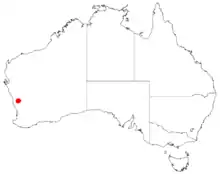| Blunt wattle | |
|---|---|
| Scientific classification | |
| Kingdom: | Plantae |
| Clade: | Tracheophytes |
| Clade: | Angiosperms |
| Clade: | Eudicots |
| Clade: | Rosids |
| Order: | Fabales |
| Family: | Fabaceae |
| Subfamily: | Caesalpinioideae |
| Clade: | Mimosoid clade |
| Genus: | Acacia |
| Species: | A. aprica |
| Binomial name | |
| Acacia aprica Maslin & A.R.Chapman | |
 | |
| Occurrence data from AVH | |
Acacia aprica, or blunt wattle,[2] is a shrub belonging to the genus Acacia and the subgenus Juliflorae. It is native to the Wheatbelt region of Western Australia.[3]
Description
The diffuse spreading shrub can grow to a height of 0.3 to 2 metres (1 to 7 ft). It flowers from June to July producing yellow flowers. The plant will grown in red loam, sand or gravel soils and is often found on the plains or rocky hills.[3]
Distribution
It grows in Beard’s Province: South-West Province, and in the IBRA regions: Avon Wheatbelt, Geraldton Sandplains.[3]
Endangered species
It is listed as critically endangered under the Wildlife Conservation Act of Western Australia,[4] and as endangered on the IUCN redlist.[2] and under the Commonwealth environmental protection act.[1]
It is mainly found on roadside verges and in small areas of remnant native vegetation within farmland, giving rise to the following threats:
- disturbance from road and firebreak maintenance;
- chemical drift from fertilisers and herbicides;
- competition from weeds; and
- inappropriate fire regimes[2]
See also
References
- 1 2 Acacia aprica, Species Profile and Threats Database, Department of the Environment and Heritage, Australia.. Retrieved 16 November 2018.
- 1 2 3 Williams, E. (2017). "'Acacia aprica'". IUCN Red List of Threatened Species. 2017: e.T22483867A22484151. doi:10.2305/IUCN.UK.2017-2.RLTS.T22483867A22484151.en. Retrieved 13 June 2018.
- 1 2 3 "Acacia aprica". FloraBase. Western Australian Government Department of Biodiversity, Conservation and Attractions.
- ↑ Government Gazette(2018) Wildlife Conservation (Rare Flora) Notice 2017.Government Gazette, 16 January 2018, p.189 Retrieved 13 June 2018.
